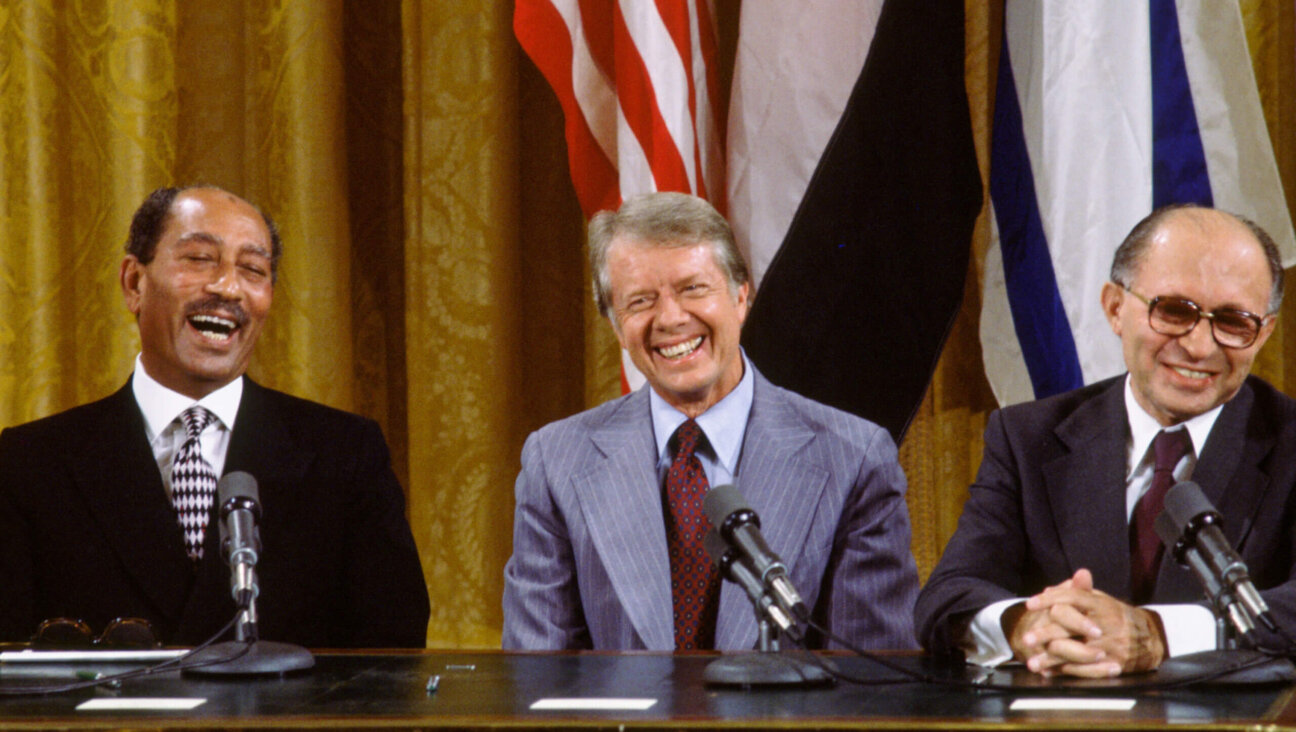To Fight The Kotel Decision, U.S. Jews Have To Understand Israeli Politics

Image by israel government
One day in May 1935, Soviet dictator Joseph Stalin welcomed French Foreign Minister Pierre Laval to Moscow to discuss the rising Nazi threat and France’s defensive plans. How many troops mobilized? Armored divisions? Artillery? At one point, historians say, Laval asked Stalin to ease his harsh treatment of Russian Catholics in order to ensure the pope’s support for their side. “The pope?” Stalin replied in mock surprise. “How many divisions has he got?”
Some version of that conversation is surely replaying in the back of Benjamin Netanyahu’s mind this week as the Israeli prime minister ponders the latest uproar in his relations with the Jewish Diaspora. In the space of a single day, June 25, his government approved two separate measures to tighten certain religious restrictions, rolling back several modest liberal reforms that the biggest American Jewish organizations had fought for years to achieve.
One of the new measures will tighten the rules for conversion to Judaism, which had been eased in recent years following decades of Diaspora pressure and tough Israel-Diaspora negotiating. The other measure freezes construction on a new prayer plaza alongside the Western Wall, Judaism’s holiest shrine, meant to accommodate non-Orthodox worship services. The changes result from pressure by Israel’s Haredi or ultra-Orthodox community, whose parties hold 13 of the 120 seats in the Knesset, enabling them to make or break ruling coalitions.
Leaders of centrist and liberal American Jewish institutions maintain that undoing the long-sought reforms highlights Israeli officialdom’s refusal to recognize the Judaism practiced by most American Jews and sours relations between the world’s two largest Jewish communities. But ultimately, Americans’ ability to influence Israeli law is dependent on the willingness of government decision-makers to stand on principle and defy the Haredi parties. And when push comes to shove, government leaders ask American Jewish liberals the question Stalin asked: How many Knesset seats have you got?
It’s important to note that the two measures differ widely in the populations they’ll affect and the nature of their impact. The Western Wall measure, ending the effort to build a non-Orthodox prayer space, amounts to a symbolic delegitimation of the Judaism practiced by the majority of American Jews by telling them there is no place for their prayers at Judaism’s holiest site. It has little impact on Israelis, however, because American-style liberal Judaism has little foothold and gets little attention in Israel.
The conversion measure, by contrast, has no direct connection to American Jews’ advocacy of religious pluralism in Israel. American Jewish organizational leaders have been pressing for Israeli recognition of conversions performed by Reform and Conservative rabbis. The Israeli liberalization that’s targeted for rollback ended the monopoly of Israel’s Haredi-controlled Chief Rabbinate and allowed would-be converts to seek out more permissive or liberal-leaning Orthodox rabbis, but still excluded non-Orthodox rabbis. The main beneficiaries have been the quarter-million-odd immigrants, mostly from the former Soviet Union, who are not recognized as Jewish by the state rabbinate — mostly children of intermarriage — who can become citizens but can’t marry other Jews. The bill approved by Netanyahu’s ministers on June 25 and sent to the Knesset for consideration would restore the Chief Rabbinate’s monopoly.
The liberalization was a response to the growing strength and influence of the Haredi rabbinate within Israeli Orthodoxy, particularly their influence on the Chief Rabbinate, nominally a Religious Zionist institution. In recent decades, under Haredi pressure, the rabbinate has tightened standards for conversion, requiring that converts commit themselves to living an Orthodox lifestyle after conversion — this on the assumption that while a born Jew may fail to observe the commandments, one cannot apply from outside to become a bad Jew. Since the process coincided with the arrival of hundreds of thousands of immigrants whose Jewishness was not recognized by the rabbinate, a crisis arose. Just when demand for conversion began to soar, the process became increasingly draconian. What’s important is that the struggle had virtually nothing to do with the demands of the U.S.-based non-Orthodox denominations.
As different as they are, though, the two new measures share this: They reflect the growing power of the Haredi rabbinate and its Knesset representatives. The Haredi parties have punched above their weight for years because they held the balance of power within the Knesset, being willing to join either a left-wing or a right-wing coalition. Haredi rabbis reject the Modern Orthodox doctrine that the modern state of Israel is part of a divine plan to restore the ancient Jewish kingdom. Accordingly, they believe that biblical laws governing monarchy and statecraft don’t apply to modern Israel. Therefore there’s little religious significance to the question of who rules the West Bank.
So Shas, the Sephardic Haredi party, was part of the Yitzhak Rabin government that signed the Oslo Accords in 1993, as well as the Ehud Barak government that offered the Palestinians statehood at Camp David in 2000. For part of that time, the Ashkenazi Haredi party, United Torah Judaism, followed Shas to the government table.
Shas’ comfort level in Labor-led governments was enhanced by the party’s leader, Aryeh Deri. In addition to his religious fundamentalism, Deri is a dove on foreign policy and a social democrat on economic policy, and he’s long been close to several key Labor Party leaders. However, Deri went to prison for bribery in September 2000, shortly after the Camp David talks collapsed. His replacement, Eli Yishai, is a hard-right hawk with strongly conservative economic views. He pulled Shas out of the Barak coalition as soon as Deri went to prison, leading to the collapse of Barak’s government and a long period of Likud rule in which Yishai was a permanent partner.
Deri reentered politics in 2012, though, and quickly returned to the Shas leadership. He has since been one of the most liberal members of Netanyahu’s cabinet. He’s publicly stated that his own inclination would be to join a left-leaning coalition, but his mostly working-class voters “expect” him to join with Likud.
But Deri’s backing could be up for grabs again this year. Netanyahu, who’s expected to call new elections soon, is under investigation by Israel’s national police for at least three suspected corruption cases, and is expected to face indictment in the coming weeks or months. If he’s charged, the next election could be competitive.
Labor and the larger body it controls, the Zionist Union, hold 24 seats (to Likud’s 30) in the current Knesset. Under the respected but colorless chairman Isaac Herzog, it’s dropped to single digits in the polls. However, the party will hold a leadership primary on July 4, and some observers see a possible revival in the cards. The two leading candidates likely to advance to a runoff are popular figures with the public — trade union firebrand and former defense minister Amir Peretz and former banker, telecoms executive and environmental affairs minister Avi Gabbai. Significantly, both are of Moroccan origin, countering Labor’s longtime image as a voice of the Ashkenazi elites and possibly opening new opportunities among Likud’s working-class Sephardic base. Perhaps most important, both are on good terms with fellow Moroccan-born Deri.
Also in the mix is the Yesh Atid party of former finance minister Yair Lapid. Polls in recent months have shown him running close to and occasionally ahead of Netanyahu. He entered politics as a foe of Haredi Judaism, but as the prime minister’s job has seemed more attainable, he’s moderated his views and worked hard to ingratiate himself with the traditionalists.
The bottom line in all this is that Deri and the 13 Haredi Knesset seats are in play in a way they haven’t been for more than a decade. A half-year ago, when Netanyahu began toying with early elections, it looked like a cakewalk for him. Now, between his own legal troubles, new energy on the left and Deri’s visible impatience with the company he’s now keeping, the prime minister has every reason to be very nervous — nervous enough to risk seriously damaging relations with American Jewry, Israel’s most important ally, in order to keep his coalition together.
American Jews may have good sense and historical necessity on their side as they fight for a place to pray alongside the Western Wall, but as Stalin might have reminded them, they don’t have the weapon that counts.
On the other hand, Stalin didn’t live long enough to see another pope, John Paul II, bring down the Soviet Union without a single division under his command. So it’s worth remembering another maxim, this one from the rabbinic wisdom literature: Since the fall of the Holy Temple, prophecy has been bequeathed to children and fools. Or as Yogi Berra once said: it’s tough to make predictions, especially about the future.
A message from our Publisher & CEO Rachel Fishman Feddersen

I hope you appreciated this article. Before you go, I’d like to ask you to please support the Forward’s award-winning, nonprofit journalism so that we can be prepared for whatever news 2025 brings.
At a time when other newsrooms are closing or cutting back, the Forward has removed its paywall and invested additional resources to report on the ground from Israel and around the U.S. on the impact of the war, rising antisemitism and polarized discourse.
Readers like you make it all possible. Support our work by becoming a Forward Member and connect with our journalism and your community.
— Rachel Fishman Feddersen, Publisher and CEO























